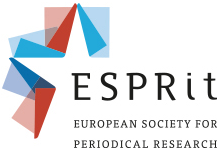ESPRit online seminars Autumn 2021
ESPRit online seminars, Autumn 2021: ‘Crossover influences and local identities of the popular illustrated periodicals of the nineteenth and twentieth centuries’
In order to build our online ESPRit community, we are organising a series of one-hour online seminars in collaboration with the ETMIET/KENI team from Panteion University (Athens). The first series was held in the Spring of 2021. Recordings are available here. You are now invited to the second series:
November 5, 3PM CET: Keynote lecture by Evanghelia Stead (Institut Universitaire de France / Université de Versailles), Exploring Periodicals through Images and Networks
Supported by individual investigation and collaborative work, the presentation offers a comparative and interdisciplinary approach to periodicals. It broaches the beneficial effects of collective exchange, and flags up some of the counter-productive effects and burdens. It embraces not so much strict methodologies as tactics and ploys to variously approach such a varied and complex field. The talk first discusses visual studies and interdisciplinarity. There follows an overview of group work on periodical networks, stressing the importance of relational dynamics. It further shows the preconceptions and limitations behind such expressions as “little magazine” and the recurrent split separating big mags from small reviews. Its conclusion reasons why periodicals are so fascinating and invites further discussion.
The recording of this session is not available
November 19, 3PM CET:
1) Susann Liebich (Heidelberg University), A New Zealand ‘quality magazine’: The Monocle, 1937-1939
2) Felix Larkin, Periodicals and Journalism in Twentieth-Century Ireland
10 December, 3-4 PM CET:
1) Yelizaveta Raykhlina (New York University), From Paris to the Russian Provinces: Russian-language Fashion Magazines of the late 1830s and 1840s as Domains of Cultural Adaptation and Women’s Entrepreneurship.
2) Effrosyni Zacharatou (Athens School of Fine Arts), From Europe to Greece: The illustrated magazine as a distinct form
